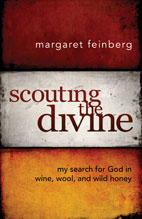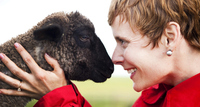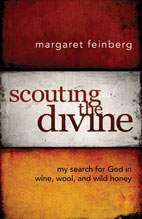As we finished our tea and truffles, I took Lynne to the book of 1 Samuel. I explained that the first mention of someone in Scripture often reveals something significant about the person’s character. The first king of Israel, Saul, is introduced as a young man trying, unsuccessfully, to find his father’s donkeys. This humorous scene hints at Saul’s later inability to lead others well. Though his early years of ruling God’s people are marked by humility and self-control, over time Saul becomes disobedient, jealous, and full of hatred. He’s known as the foolish king who lost his crown.

The introduction of Saul stands in sharp contrast to the first mention of David, the second king of Israel. The prophet Samuel is told by God that one of the sons of Jesse will be the next king. Noting that the Lord hasn’t chosen any of the first seven sons of Jesse, Samuel asks the father if he has any other sons. Jesse responds, “There remains yet the youngest, and behold, he is tending the sheep” (1 Samuel 16:11). When we meet David, he’s watching over his family’s livelihood.
The Hebrew word for youngest, qatan, implies insignificant and unimportant. One translator even uses the word “runt.” Though David is the runt of the litter, God selects him to rule over Israel.
“Does it surprise you that the youngest child was caring for the sheep?”
“Not at all,” Lynne said. “In ancient societies, and even today in remote areas, the weakest members of a family are often the ones assigned to care for the sheep. When we were in Peru staying with a family, a five-year-old boy, a few women, and an old man took care of the family’s sheep. The shepherds were those who lacked the strength or skill to do more physically demanding labor.”
In the Bible, the younger siblings are often responsible for shepherding, while the older children are given more important jobs. Though Cain is older, Abel keeps the animals. While some shepherds were strong like Abraham’s son, Issac, who makes the Philistines jealous with his abundant flocks (Genesis 26:14), many times the younger brothers or even daughters care for the sheep. Rachel, the younger sister of Leah, is recognized as a shepherdess. In fact, while watering sheep at a well, she meets Jacob and eventually falls in love (Genesis 29:2–11).
I couldn’t believe what Lynne was saying. Those considered the weakest members of society—the children, women, and the elderly—were sent out to protect the sheep. Within this context, the story of David made more sense to me. David isn’t just the youngest brother; he’s the least qualified choice in the eyes of everyone. He takes care of the sheep, because everyone else in the family has more important duties. Samuel’s selection of David must have shocked them all.
“I think shepherding teaches you a lot about management,” Lynne said. “It helps you develop a big-picture perspective and planning skills. As a shepherd, I’m constantly scanning when I’m with the sheep, looking for weakness, sickness, and changes in behavior—which teaches you to pay attention to a lot of different things. Caring for a big flock multiplies the need for all those skills, including learning to anticipate, schedule, organize, and strategize.
“Shepherding also teaches you how to lead from the front rather than the back. Whenever sheep are pushed, they’ll respond in fear or anxiety—even when, as their shepherd, I do it. Pushing a sheep produces agitation. But when I go ahead of the flock and call them by name, they follow me peacefully. They trust me, and they want to follow. Anyone can lead by agitating, but leading in such a way that those behind you want to follow is an art form.”
Lynne’s words echoed some of the wisdom of the Psalms. In Psalm 78:72, we learn that David shepherds with integrity of heart, and with skillful hands he leads his sheep.
I read, “`Behold I send you out as sheep in the midst of wolves; so be shrewd as serpents and innocent as doves (Matthew 10:16).
“Does this mean that God wants his children to be like helpless sheep in the midst of predators? What does that mean to you?” I asked Lynne.
“When the sheep are in the pasture and a predator like a dog walks by and they’re in danger or what they perceive as danger, the sheep are alert!” Lynne explained. “They will come together as a group. To me, that’s being shrewd. If you’re a sheep in the midst of wolves, you’re not going to stand alone, chew your cud, and wait for a wily wolf to jump you. You’re going to do everything possible in being alert, bold, and together.”
“How does that affect the way we act and react?” I pressed.
“I think Jesus is saying you need to be vigilant, alert, and even stomp your foot like sheep do in boldness, but in the end never give up being a sheep,” Lynne said. “Never give up your sweet, trusting nature. Always remember the strength and safety that comes in community.”
I know many people who have left the safety and protection of the flock of the church to pursue God on their own. I applaud their desire for an authentic relationship with Jesus, but I wonder if a parallel exists between the safety found in a flock under the care of a good shepherd and the safety found in a church under the care of a good pastor. Some of my friends who quit the church have had their belief systems infected by parasites of bitterness and anger or been unable to heal from that which affected them while they were in the church. Others have been picked off by predators of doubt and quit believing in God altogether. Still others have held on, searching for sustenance and fellowship with other wandering sheep. Yet those who choose such a path often find the journey far more difficult and perilous than they ever imagined.

Excerpted with permission fromScouting the Divine by Margaret Feinberg.










